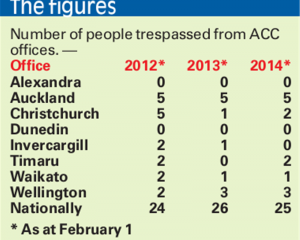Acclaim Otago president Dr Denise Powell said ACC insisted all clients signed the "very open-ended and extremely broad" consent form or risked having entitlements suspended.
Such use of "coercion" to obtain consent breached the Privacy Act, she said.
Acclaim Otago made submissions last week to to an independent inquiry over ACC privacy issues, commissioned after a recent major breach of privacy.
The names of several hundred Otago claimants were among the thousands included in an email mistakenly sent to Auckland resident Bronwyn Pullar last year.
ACC said the consent forms were for administrative ease, but even such important considerations should not override "a person's right to know what information is being collected/disseminated, to whom, and for what purpose", Dr Powell said.
The consent form was general and claimants did not know specifically what they were consenting to.
It was "not realistic or reasonable" for people "to grant advanced consent for the life of the claim to every requirement from ACC, without having any specific knowledge of each set of circumstances, nor regard to the legislation, which could well change over time."
Dr Powell would be "very happy" if there was a return of "common sense" over the legitimate privacy rights of ACC claimants, she said in an interview.
No comment was immediately available from ACC about the "open-ended" nature of the form, lead media adviser Stephanie Melville said.
She said other matters raised fell within the terms of reference for the current review.
The Privacy Commissioner's review, conducted by Australian Federal Privacy Commissioner Malcolm Crompton and a senior KPMG representative, was expected to be completed about the end of this month,she said.
Acclaim concerns
• "Extremely broad" claimant consent form and its use breaches several privacy principles.
• "Lack of standardised procedures" to correct material held in claimant files.
• Increased security needed to protect "sensitive medical/health information" too readily accessible through general files.
• Need for culture change over privacy in some quarters at ACC.
• Need for mandatory reporting of ACC privacy breaches and other reforms to ensure "harm is minimised".





